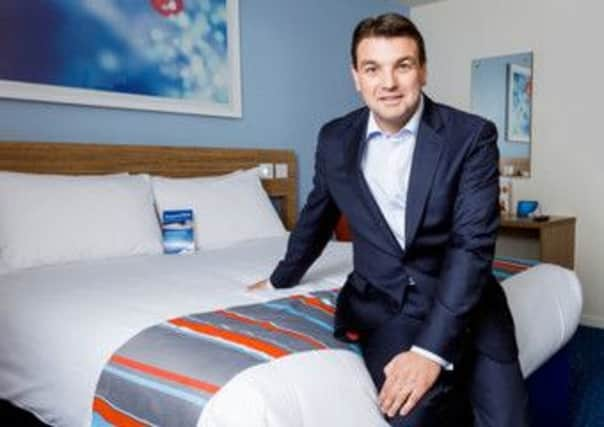Monday interview: Peter Gowers, Travelodge


Chatting to other customers helps the hotel group chief executive keep in touch with needs and trends – and he can always rely on his children to give him a frank assessment of the comfort of a room or bed. Even on business trips he makes the most of his time in a town or city – he was up early on his latest visit to Edinburgh to take a walk in the morning sunshine.
“There is a danger when you are a chief executive that you rely too much on research,” he says, over a coffee at the café in the group’s Old Town hotel. He and other Travelodge executives often choose to go to a hotel and talk to guests instead of commissioning a survey.
Advertisement
Hide AdAdvertisement
Hide AdAlthough the budget end of the market has fared best across many sectors in the wake of the recession, not just hotels, Travelodge struggled and was forced to refinance in 2012. Gowers says the company was punished for losing touch with its customer base.
The chain closed almost 50 hotels and changed owners, but by the time Gowers arrived in November it was already eyeing new growth.
He is using his personal travel experiences to find business opportunities – on his latest family holiday on Mull, he noticed departure town Oban as a possible venue with potential to attract people on short breaks as well as those passing though on the way to the islands.
A regular visitor to the Highlands, he plans to open up to ten further sites in Scotland, which he says is under-represented in the company’s portfolio despite it being one of the biggest hotel operators in Edinburgh.
He says: “I love the hotel business, I’m passionate about travel and I’ve always loved to travel in the UK. I think travelling around our country is a wonderful thing to do.”
His visits north of the Border mean he would be personally saddened to see Scotland vote to leave the UK in September’s independence referendum, but he says the business will find a way of working, whatever the outcome is.
Gowers joined Travelodge from Safestore Holdings, though he had spent just two years at the helm of the self-storage operator and seems delighted to be back in the hotels business. He previously headed up the Asia-Pacific region for InterContinental Hotels Group (IHG), based in Singapore. Before that he was the group’s chief marketing officer, overseeing some of the biggest re-branding exercises ever in the sector.
Gowers is impressed with attempts to further promote Scotland as a tourist destination, as he expects it will benefit from more short break visitors from elsewhere in the British Isles as the economy picks up but people continue to be careful about their finances.
Advertisement
Hide AdAdvertisement
Hide Ad“Look at who is winning at the moment – it’s Lidl and Aldi, it’s the value end of things that is on the up,” he says.
But although they are careful with their budgets, consumers now want a relatively high standard from their value brands. Gowers is clear that while his customers did not want a radical change in Travelodge’s offering and didn’t want it to move upmarket, but they did feel it was time for the firm to move with the times.
“Perceptions [of value firms] have been transformed by companies like Ikea, or Zara on the high street,” he says. “We are investing about £1 million a week in modernising our hotel rooms. Our customers were telling us it was time for a bit of a makeover.”
The firm is putting new beds in all of its 38,000 famously standardised rooms, as well as giving them a lick of paint and matching decor. There is more colour, and also practical touches. From experience of his son and daughter bickering over sofabeds, Gowers is particularly pleased with a set-up that allows extra beds to be made up in the rooms.
Locations are also shifting – whereas once holidaymakers were prepared to compromise on location in their search for value, now they expect to stay in city centres. Desirable university and market towns are also seeing brisk business, Gowers says.
But interest in other locations has dwindled, and he is pleased the 2012 restructuring gave the firm the chance to drop some of its less popular hotels.
The modernisation and new locations are also helping Travelodge to pick up business travellers as finance directors take an increasingly tough line on expenses and firms make an effort to be seen to be serious about keeping costs under control. Needless to say, Gowers stays in Travelodges on his frequent business travels, as well as being booked in for his next family weekend away, in the Lake District.
He has a down-to-earth approach and is happy running a privately-owned company – and, as he casually interacts with customers in the hotel’s corridors, he admits he never liked the regime of analysts’ meetings and results calls that came with being an executive of a listed firm.
Advertisement
Hide AdAdvertisement
Hide AdBut with a raft of flotations among UK companies and a particular appetite for value operators, it may only be a matter of time before he finds himself back under the stock market regime.
Travelodge’s owners following its re-financing – GoldenTree Asset Management, Avenue Capital Group and Goldman Sachs – have not shown any sign of wanting to offload it yet, and are in the middle of an expansion drive that is seeing them invest up to £75m in new Scottish hotels alone.
Gowers says he takes comfort from the fact that the market is reflecting a widespread confidence in the economic recovery, and in the UK travel and tourism segment in particular.
But any decision to take Travelodge to the market would be a matter for the owners, he adds.